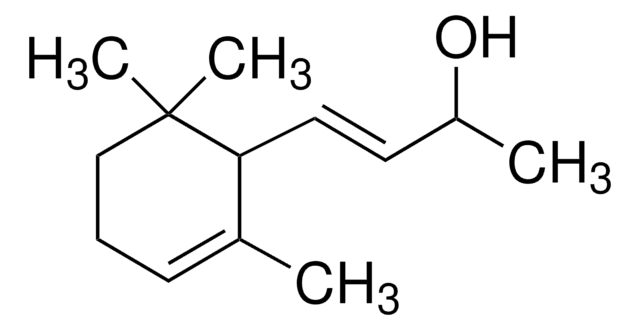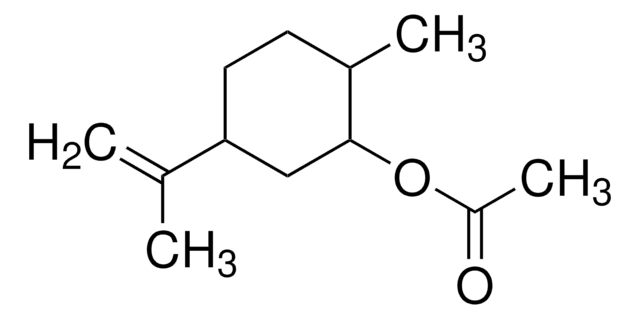W259403
α-Ionone
≥90%, stabilized
Synonym(s):
4-(2,6,6-Trimethyl-2-cyclohexenyl)-3-buten-2-one
About This Item
Recommended Products
biological source
synthetic
Quality Level
grade
Fragrance grade
Halal
Kosher
Agency
follows IFRA guidelines
reg. compliance
EU Regulation 1223/2009
FDA 21 CFR 117
FDA 21 CFR 172.515
Assay
≥90%
contains
synthetic α-tocopherol as stabilizer
refractive index
n20/D 1.498 (lit.)
bp
259-263 °C (lit.)
density
0.93 g/mL at 25 °C (lit.)
application(s)
flavors and fragrances
Documentation
see Safety & Documentation for available documents
food allergen
no known allergens
fragrance allergen
no known allergens
Organoleptic
berry; cherry; woody; raspberry; violet
SMILES string
CC(=O)\C=C\C1C(C)=CCCC1(C)C
InChI
1S/C13H20O/c1-10-6-5-9-13(3,4)12(10)8-7-11(2)14/h6-8,12H,5,9H2,1-4H3/b8-7+
InChI key
UZFLPKAIBPNNCA-BQYQJAHWSA-N
Looking for similar products? Visit Product Comparison Guide
General description
Application
- Dietary supplementation with α-ionone alleviates chronic UVB exposure-induced skin photoaging in mice.: This research demonstrates that α-ionone can mitigate the effects of chronic UVB exposure, reducing skin photoaging in mice. The findings suggest potential applications for α-ionone in skincare and dermatological products (Geng et al., 2024).
- Re-Rolling Treatment in the Fermentation Process Improves the Aroma Quality of Black Tea.: This research shows that re-rolling treatment during fermentation enhances the aroma quality of black tea by increasing the concentration of volatile compounds, including α-ionone, which contribute to the tea′s overall flavor profile (Chen et al., 2023).
Disclaimer
Signal Word
Danger
Hazard Statements
Precautionary Statements
Hazard Classifications
Resp. Sens. 1
Storage Class Code
10 - Combustible liquids
WGK
WGK 2
Flash Point(F)
244.4 °F - closed cup
Flash Point(C)
118 °C - closed cup
Personal Protective Equipment
Certificates of Analysis (COA)
Search for Certificates of Analysis (COA) by entering the products Lot/Batch Number. Lot and Batch Numbers can be found on a product’s label following the words ‘Lot’ or ‘Batch’.
Already Own This Product?
Find documentation for the products that you have recently purchased in the Document Library.
Customers Also Viewed
Our team of scientists has experience in all areas of research including Life Science, Material Science, Chemical Synthesis, Chromatography, Analytical and many others.
Contact Technical Service














